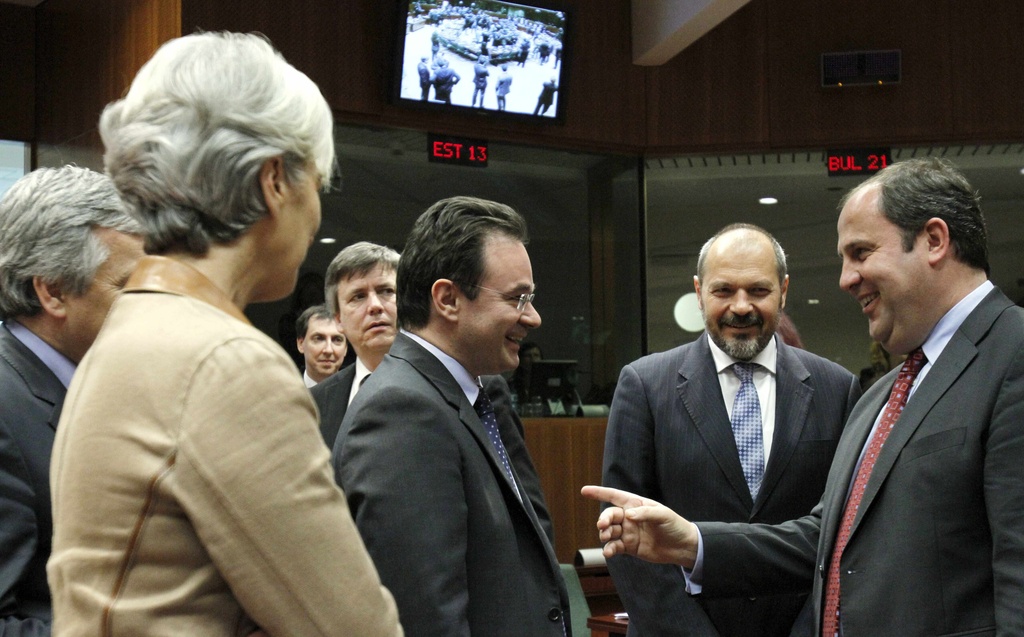
Ministers throw eurozone huge life ring

European countries have pledged upwards of €750 billion (SFr1.1 trillion) to defend the embattled euro and the eurozone’s weakest nations struggling with debt.
Six central banks, including the Swiss National Bank (SNB) also announced a concerted action to foster stability by easing access to US dollars for European lenders.
Other central banks, including the Bank of Canada, the Bank of England, the European Central Bank and the Bank of Japan are also involved in the temporary dollar-swap plan, made possible after the United States Federal Reserve reopened a programme to ship billions of dollars overseas.
The idea is to pump more short-term cash into the financial system to make sure banks have the dollars they need.
Separately, the European Central Bank (ECB) jumped into the bond market, saying it was ready to buy eurozone bonds to shore up liquidity in “dysfunctional” markets.
The rescue package includes a €250 billion-credit line from the International Monetary Fund (IMF). EU ministers agreed to cobble together another €500 billion using funds from a collective EU pot and guarantees from euro states, including Sweden and Poland. The measures will be carried out over three years.
EU Monetary Affairs Commissioner Olli Rehn told a news conference that the size of the package “proves we shall defend the euro whatever it takes”.
Sigh of relief
The package comes after a financial meltdown in Greece drove sovereign debt level yields – and the insurance on that debt – to record levels.
The ECB noted that some governments had vowed to accelerate their fiscal consolidations to get their books in order. Spain’s budget deficit reached 11.2 per cent of gross domestic product last year. Portugal’s was 9.4 per cent and Greece hit 13.6 per cent.
The sheer size of the parachute announced around 3am on Monday morning surprised financial analysts and the euro rose close to two per cent while stocks in Asia firmed up.
Markets, rattled for weeks by the prospect that Greece would default on its mountain of debt, heaved a sigh of relief.
Switzerland is not a member of the EU but does contribute to the IMF.
The Swiss blue chip barometer, the SMI, stood three per cent higher at 9:30am local time at 6,392.24 points. The Swiss Leader Index advanced 3.45 per cent to 981.08 points while the broad Swiss Performance Index was up 3.28 per cent at 5,651.49 points.
The euro climbed to $1.2963, up from the 14-month low of $1.2523 it hit late last week. Japan’s Nikkei 225 stock average rose 1.3 percent to 10,499.25 and Hong Kong’s Hang Seng index climbed 0.8 percent to 20,080.18.
Futures suggested Wall Street would welcome the euro defence. Dow futures jumped 233 points, or 2.3 percent, to 10,568, and S&P and Nasdaq futures were both up more than 2.7 percent.
Will it work?
The measures could bring a modicum of relief to Swiss exporters and investors who worry the Swiss franc may grow too strong while the euro circles the drain. Commentators wondered about the costs.
The Geneva-based Le Temps newspaper said the relief package is “just part of the equation” and spoke of a “mortgage big enough for generations to come”.
“For the remedy to work, the sick eurozone will have to give birth to economic governance at the height of its single currency,” Richard Werly wrote in an opinion article called “Waltz of the billions”.
He added that it will require “sacrifices to dispel a little more the last illusions of sovereignty”.
Across the country in Zurich, the Tages-Anzeiger newspaper said the rescue package brings back memories of a similar bailout for banks last year.
“That’s no coincidence,” wrote Rita Flubacher.
“[The package] is not only to corral ice-cold, calculating speculators in the US and Asia. It’s also for banks, insurance companies and pension funds that do not want to see their assets fade away after being urged by politicians to flee from highly speculative securities into presumably safe state bonds.”
Will it work?
“We will know by today,” Flubacher concluded.
swissinfo.ch and agencies
European nations aim to formally launch the biggest-ever financial bailout of a country this week, hoping to calm markets wary that Greece’s rescue may be the first of several, expensive measures to shore up other economies.
Greece intends to bring its fiscal deficit down to the EU limit of three per cent of gross domestic product by 2014 from 13.6 per cent in 2009.
The first rescue of a member of the 16-nation bloc aims to stem a debt crisis that has shaken markets, dented confidence in the euro and begun to spread to fellow eurozone weaklings Portugal and Spain. Berlin’s hesitancy has fuelled market panic.
Eurozone leaders held a special summit over the weekend to formally launch the aid, following weeks of tough talk and procrastination due to public opposition to handouts for Greece.
German politicians voiced reluctance to approve the rescue, posing a challenge to Chancellor Angela Merkel who said she would fight for parliamentary approval by the end of the week. Berlin’s share of the loans is the biggest of any EU state at about €22 billion out of €80 billion.

In compliance with the JTI standards
More: SWI swissinfo.ch certified by the Journalism Trust Initiative

























You can find an overview of ongoing debates with our journalists here . Please join us!
If you want to start a conversation about a topic raised in this article or want to report factual errors, email us at english@swissinfo.ch.